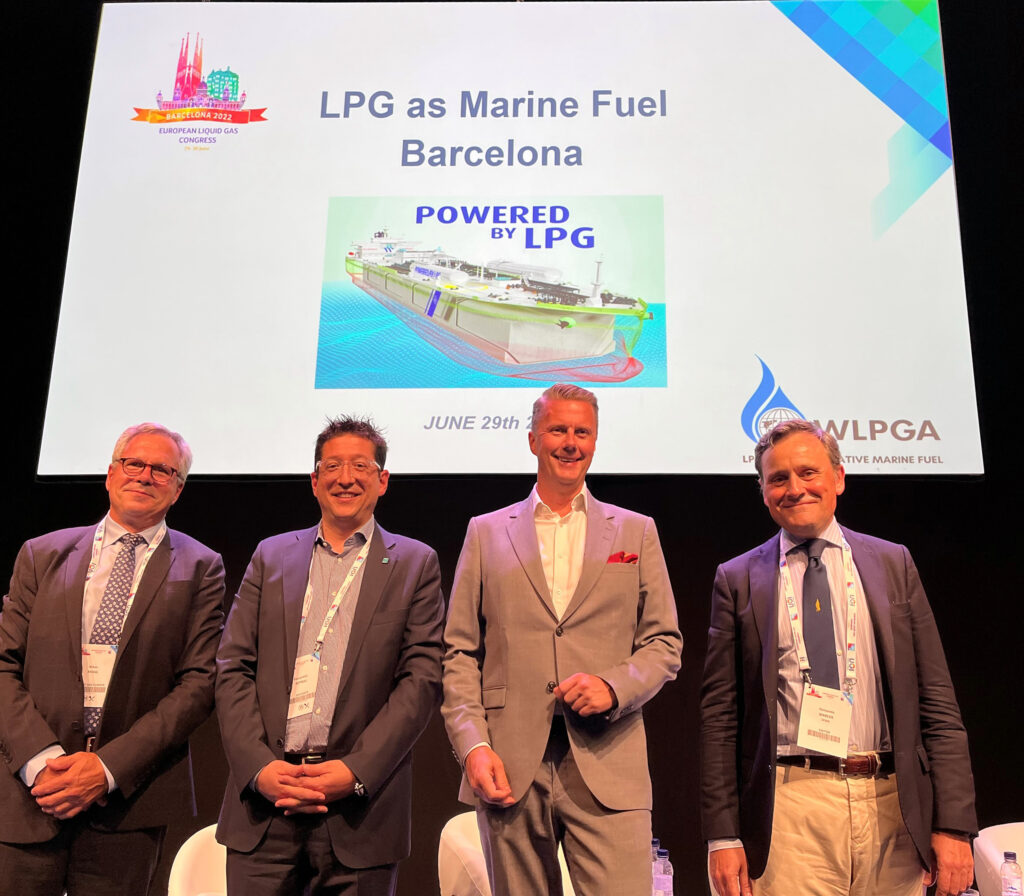

Summary
In a presentation titled “Operational Learnings from World’s First LPG Dual-Fuel Propulsion Retrofitting Project”, Pontus Berg talked about our operational learnings and some teething challenges at the World LPG Association Member Engagement Meetings in Barcelona, Spain, on 28 June 2022.
Date: 28 June 2022
Event: World LPG Association Member Engagement Meetings
Presentation Deck: Download
Key Highlights
BW LPG have been pushing strongly for the shipping industry to adopt the use of LPG as marine fuel. We are leading by example, by committing 130 million US dollars to retrofit 15 Very Large LPG Carriers with pioneering LPG dual-fuel propulsion technology. Our ambitious, multi-year, multi-stakeholder project was completed successfully within budget and ahead of schedule in May.
HOW LPG Dual-Fuel Propulsion Technology Works
First, LPG tanks are filled using the cargo system during loading. LPG is drawn into a fuel gas supply system and piped to the engine. A small amount of compliant pilot fuel, such as diesel, is injected into the engine as the piston nears the top. It sparks under pressure, and LPG burns to create propulsive force. These LPG dual-fuel engines will reduce emissions of Sulfur Oxides by about 97%, Particulate Matters by about 90%, Carbon Dioxide by about 15-20% and Nitrous Oxides by about 20%. Apart from these environmental advantages, we also benefit operationally and commercially. For example, LPG propulsion improve total voyage fuel economics. With LPG, we eliminate bunker quality issues and spill risks. And with dual-fuel capability, we have fuel flexibility which translates to full redundancy to ensure uninterrupted operations and buffering from fuel price sensitivities.
Operational Learnings
Since the re-delivery of our first LPG powered vessel the BW Gemini in November 2020, we demonstrate that shipping is ready for LPG as a mainstream marine fuel. Having great people collaborating was fundamental to our success. We had to manage minor quality concerns from main and sub-suppliers, but overall, we had a good experience. Special thanks go to Yiu Lian dockyard for their flexibility and patience, and to Wärtsilä and MAN ES for partnering us in this pioneering project. By far, what has been the most challenging, has been the impact of COVID-19 on the movement of people and parts. We spent over 14,000 hours in quarantine, crew are confined to the vessel and yard with no shore leave, and we had to manage delayed deliveries of critical spare parts. Thankfully, we have kept such impact to a minimum, with a lot of collaboration and innovative thinking from our site team and partners. We did not have any major surprises during the retrofitting process. This is thanks in part to a very rigorous testing of our prototype, but mostly because of our talented, experienced and dedicated site team.
But as with any new technology, there are bound to be teething issues. We had to figure out what filters worked best to manage the organic content found in some LPG supply, especially those stored in natural caverns. We are also working with MAN ES to rethink designs. This is to manage clogging issues we’ve seen in our Fuel Booster Injection Valve nozzles; vibration in some hydraulic pipes; and some minor programming glitches in the overall system. Overall we are very pleased with the technology, and we continue to encourage our peers in shipping to retrofit their fleet, rather than order newbuilds.
Looking Forward
At BW, we deliver energy the world needs today, while finding solutions for tomorrow. LPG makes so much sense as a cleaner-burning fuel that is available now. As a member of the LPG industry, we will continue to be vocal about the benefits of LPG. Beyond LPG, we are exploring all available options as we think about the long term. We have an on-going project called ‘Next generation VLGC and organisation’. This includes reviewing developments in alternative fuels such as ammonia and considering alternative technologies such as carbon capture onboard. Having such discussions on alternative fuels are useful and help us make better decisions for our stakeholders.
Read more
- Read about our shipping business
- Read about LPG Propulsion
- See our fleet list
Keywords: Business, Very Large Gas Carrier, Liquefied Petroleum Gas, LPG, Volatility, Commercial, Pool, ESG, Oslo-listed, Safe, Reliable, Shipping, Energy, Maritime